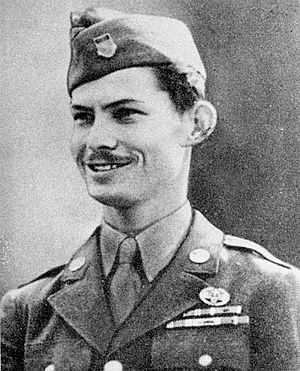Conscientious objector facts for kids
A conscientious objector (often called a CO) is a person who chooses not to join the military or fight in a war. This decision comes from very strong personal beliefs. These beliefs can be based on religion, ethics, or a deep moral feeling that it is wrong to kill other people. Some COs are also pacifists, meaning they believe all war and violence are wrong.
Throughout history, countries have treated conscientious objectors in different ways. Sometimes, COs were arrested or had to pay fines. In some places, they faced very harsh punishments, even death. However, after major conflicts like World War II, many Western countries started offering other options. Instead of fighting, COs could do non-military work, like helping in hospitals or communities. These are called "alternative services." Often, special groups would decide if a person's beliefs were truly against fighting, or if they were just afraid of war.
Today, many international organizations support the rights of conscientious objectors. For example, the European Court of Human Rights has said that denying someone the right to be a CO goes against their freedom of religion and thought. The European Union also sees the right to be a conscientious objector as a basic human right.
Contents
What is a Conscientious Objector?
A conscientious objector is someone who refuses to take part in military combat. This refusal is based on their personal conscience. It means they have a strong inner sense of what is right and wrong. They believe that fighting or killing others goes against their deepest values.
Why People Become Conscientious Objectors
People become COs for several reasons. Many are guided by their religious faith, which teaches them not to harm others. Others have strong ethical or moral beliefs. They simply feel it is wrong to participate in violence. Some are pacifists, who believe that all wars are wrong and that peace should always be the goal.

A famous example is Desmond Doss. He was a Seventh-day Adventist during World War II. His faith taught him not to kill. So, he refused to carry a weapon. Instead, he served as a medic, saving many lives on the battlefield without ever firing a shot. He even received the Medal of Honor, which is a very high award for bravery.
How Countries Have Treated Conscientious Objectors
The way countries have dealt with COs has changed a lot over time. In the past, it was often very difficult for them.
Punishment and Hardship
Historically, many countries did not recognize the right to refuse military service. Conscientious objectors could face serious punishments. They might be put in jail, forced to pay large fines, or even executed. This was especially true during times of war when countries needed everyone to help with the fighting.
Alternative Service Options
After big wars, like World War II, many Western countries started to change their laws. They began to offer "alternative services" for COs. This meant that instead of fighting, COs could do other important work for their country. This work was usually non-military. For example, they might work in hospitals, help with farming, or assist in communities.
Sometimes, special groups or "commissions" were set up. Their job was to check if a person's beliefs were truly against fighting. This helped make sure that people were not just pretending to be COs to avoid military service.
Rights of Conscientious Objectors Today
In modern times, the rights of conscientious objectors are much more recognized. Many countries now protect these rights.
International Recognition
Important international bodies have spoken out for COs. The European Court of Human Rights, for example, has ruled on this issue. They have said that denying someone the right to be a conscientious objector goes against their freedom of thought and religion. This means people should be free to follow their beliefs.
The European Union also sees the right to be a conscientious objector as a fundamental human right. This means it is considered a very important and basic right that everyone should have. These protections help ensure that people can follow their conscience without fear of harsh punishment.
Images for kids
-
Conscientious Objector memorial in Tavistock Square Gardens, London—dedicated on 15 May 1994
See also
 In Spanish: Objeción de conciencia para niños
In Spanish: Objeción de conciencia para niños
 | Anna J. Cooper |
 | Mary McLeod Bethune |
 | Lillie Mae Bradford |




